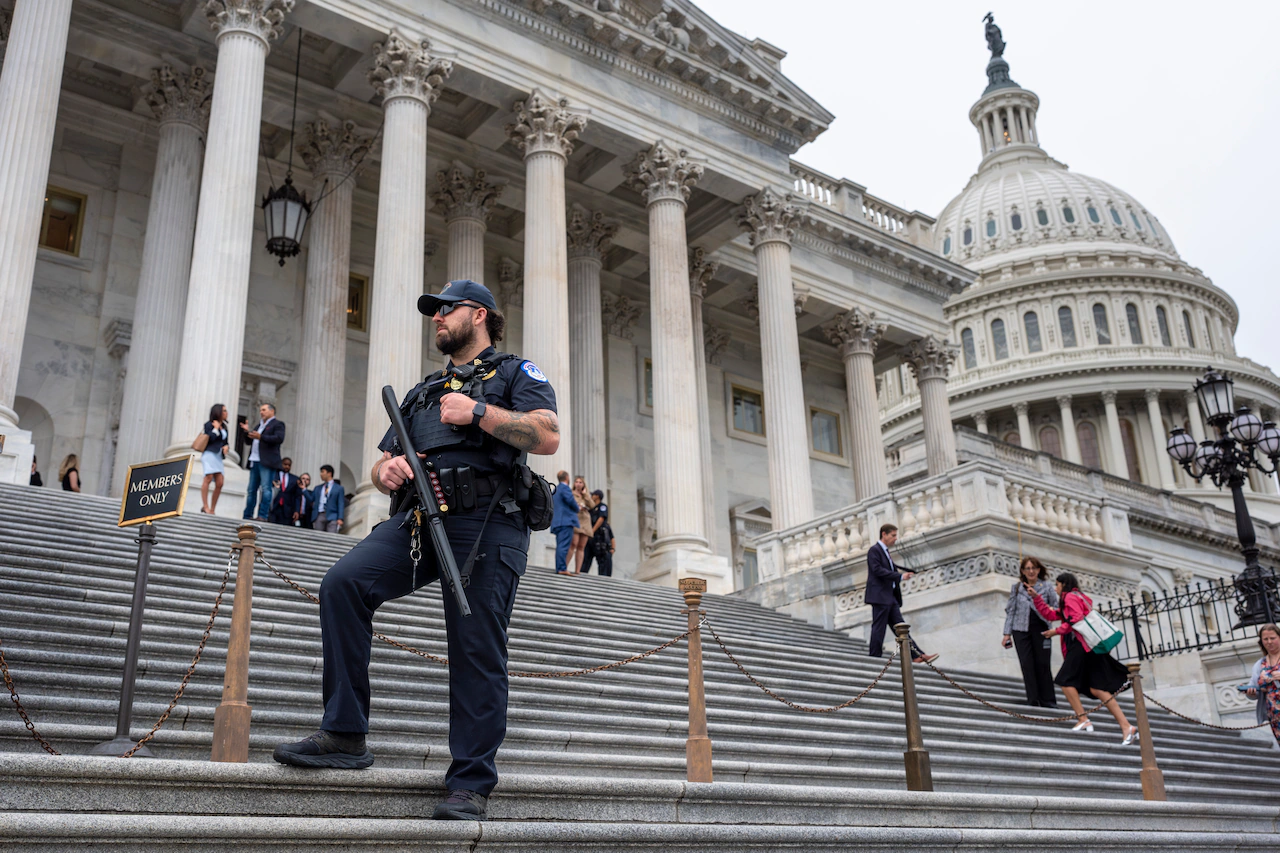Copyright cleveland.com

WASHINGTON - The assassination of conservative activist Charlie Kirk in Utah last month and the June shooting of two Minnesota Democratic lawmakers have forced a fundamental reconsideration of how politicians engage with the public—and whether the escalating threats of violence are making traditional town halls and public forums a relic of a safer era. Across the country, lawmakers from both parties are canceling outdoor events, moving gatherings indoors with metal detectors, or abandoning public appearances altogether. The trend raises troubling questions about the future of civic engagement in America, particularly for organizations built around facilitating dialogue between elected officials and constituents. “When your daughters are calling you saying ‘Dad, we’re scared,’ it’s a big deterrence for people to run for office,” House Speaker Mike Johnson said in recent remarks. “We’re going to have less and less good citizen legislators if they feel like they’re going to jeopardize the lives of their own families.” The Louisiana Republican also emphasized the unprecedented nature of the current threat environment: “With the omnipresence of the online community, people know everything about all of us—all the details, where we live, our addresses, where our children and spouses are. That threat feels more personal and more pervasive and more difficult to define than ever before.” Ohio lawmakers feel the pressure Rep. Emilia Sykes, an Akron Democrat, said the increased security concerns are fundamentally changing how she does her job. “If you’re someone like me, who is used to and very much enjoys being out and about in the community and with your constituents, it essentially is discouraging you from doing that,” Sykes said in an interview. “So we have to strike a balance that allows me to be as visible and accessible as I like to be, but keeping me safe, and not just me, the people who attend the event, my staff as well.” Sykes pointed to the 2011 shooting of then-Rep. Gabby Giffords in Arizona as an example of how violence at public events doesn’t just endanger the politician. A dozen people besides Giffords were wounded and six were killed. Sykes said she has made changes to how she conducts town halls and public events, though she declined to detail what those changes are for security reasons. She continues to hold a mix of in-person and telephone events. The congresswoman placed blame for the heightened environment squarely on inflammatory rhetoric from political leaders. “The fish rots from the head, and we’re seeing the president be the primary perpetrator of this rhetoric that incites violence,” Sykes said. Vice President JD Vance, a Cincinnati Republican, has placed the blame in the opposite direction. Appearing on Kirk’s podcast five days after his assassination, Vance pledged to dismantle what he called “this incredibly destructive movement of left-wing extremism” that he blamed for contributing to Kirk’s death. “This is not a both sides problem,” Vance said during the September 15 broadcast. “While our side of the aisle certainly has its crazies, it is a statistical fact that most of the lunatics in American politics today are proud members of the far left.” White House Deputy Chief of Staff Stephen Miller, who joined Vance on the podcast, outlined plans for an aggressive federal response. “We are going to channel all of the anger that we have over the organized campaign that led to this assassination to uproot and dismantle these terrorist networks,” Miller said, describing “organized doxxing campaigns, the organized riots, the organized street violence” as part of “a vast domestic terror movement.” The allegations come without publicly available evidence linking Kirk’s killing to organized left-wing groups, and they contradict academic research suggesting right-wing extremism poses a greater violent threat. A University of Maryland study examining extremist violence found that “right-wing actors are significantly more violent than left-wing actors.” A 2024 study from West Point’s Combating Terrorism Center analyzing 501 federal threat cases over 10 years found that anti-government and white supremacist extremism accounted for the vast majority of ideologically motivated threats to public officials. The West Point study found that law enforcement, military personnel, and judges received 43% of threats, while elected and election officials received 41% — showing the threat environment extends far beyond members of Congress. The legitimacy question The security concerns pose a difficult question: When does legitimate fear for one’s safety cross into providing cover for politicians who simply want to avoid uncomfortable confrontations with angry constituents? Earlier this year, some criticized Republican lawmakers for refusing to hold town halls to face voter backlash over controversial policies. But this year’s violence is giving politicians of both parties arguably legitimate reasons to avoid large public gatherings. Kirk, 31, the co-founder of Turning Point USA who helped turn out youth voters for Donald Trump’s 2024 presidential campaign, was shot while addressing a large outdoor crowd on a college campus. The suspect, Tyler Robinson, 22, was arrested and charged with his killing. During last year’s election season, President Donald Trump survived a pair of assassination attempts, one of which killed a volunteer firefighter. In April, an arsonist attacked the Pennsylvania Governor’s mansion while the state’s Democratic governor and his family slept. In June, a man disguised as a police officer killed Minnesota’s Democratic House Speaker emerita and her husband, and shot another Democratic Minnesota state Senator and his wife. Authorities found notebooks in the vehicle of the man charged with the crimes, Vance Boelter, listing dozens of Minnesota state and federal elected officials with their home addresses. The names of all five of Ohio’s Democratic members of Congress—Reps. Emilia Sykes, Shontel Brown, Marcy Kaptur, Greg Landsman, and Joyce Beatty—appeared in Boelter’s materials. Capitol Police contacted each of their offices to notify them, and local law enforcement provided increased security at their homes. “I was swatted last year. Now my name is linked to another violent act. No one should feel unsafe simply for serving their community,” Brown, of Warrensville Heights, said in a statement at the time. “The rise in violent rhetoric, conspiracy theories, and personal attacks is having real and dangerous consequences.” In October, a New York man who President Trump pardoned for his role in the Jan. 6, 2021, attack on the U.S. Capitol was charged with threatening to assassinate House Democratic Leader Hakeem Jeffries. Broader implications for civic life The trend extends beyond politicians. Ohioans are already staying away from public events due to fears about random violence. Nearly 300 readers responded to a cleveland.com query last month about whether recent shootings at county fairs, downtown celebrations, and other gatherings were changing how they live their lives. The responses painted a sobering portrait of fear and resignation. “I used to think my chances of getting shot somewhere were very low if not impossible. I don’t feel this way anymore. This is a horrible sad reality,” one reader wrote. Another echoed, “Ever since the shootings in Las Vegas I avoid large crowds.” Parents described new vigilance and abandoned traditions. “I took [my kids] to everything—now I wouldn’t dare,” one mother admitted. Another recalled missing the Geauga County Fair: “I recently opted out … because of the disturbances at Cuyahoga & Summit County Fairs.” One reader summed up the calculus many now make: “Anytime we are contemplating going to a large event, the topic of guns and shootings comes up. We have to REALLY want to attend the event, otherwise we pass.” The City Club of Cleveland, which has hosted public forums and debates for over a century, recently implemented enhanced security measures that reflect the changing threat environment. This month, the organization expanded its partnership with landlord Playhouse Square to include weapons detection systems and bag checks at all events — not just those deemed high-risk. “We have been thinking a lot about this for a long time,” said Dan Moulthrop, the City Club’s CEO. The organization designed its new space at Playhouse Square in 2023 with security in mind, partly in response to the 2022 stabbing attack on author Salman Rushdie at the Chautauqua Institution in New York. Previously, the City Club only used enhanced security for specific high-profile events. Now, attendees at all its events will go through a weapons detection system and bag checks, said Moulthrop, adding that similar security measures are routine at many museums, theaters and sports venues. “We realized that it’s just easier to make it standard practice,” Moulthrop said. Moulthrop noted that Jewish community organizations, particularly synagogues, have dealt with elevated security threats for years due to persistent anti-Semitism. “There’s a lot that the rest of the community can learn from them,” he said. The shift represents a sobering reality for civic institutions built on the premise of open public discourse. While the City Club has never experienced an actual security incident in at least the past 12 years, Moulthrop says, the precautionary measures reflect the broader climate of concern—and the recognition that waiting for an incident would be too late. Events canceled nationally Violence has prompted widespread event cancellations across the political spectrum. Rep. Alexandria Ocasio-Cortez, a New York Democrat, postponed two public events planned for North Carolina following Kirk’s death, including a rally in Raleigh. “From the moment I was elected, I have felt that I accept a certain level of risk in doing this job,” Ocasio-Cortez told reporters, according to NBC News. But she added that security protocols for members of Congress are “for a bygone time. ... They’re not designed for a digital threat environment era.” Republican Rep. Nancy Mace of South Carolina, who is running for governor, told reporters she was canceling all outdoor and public events for the foreseeable future, including an upcoming speaking engagement on a college campus. “I will have a firearm on my person all the time, and I will have security,” Mace said, according to NBC News. Rep. Jim Clyburn of South Carolina, a former top Democratic leader, had his staff cancel events in Columbia and Charleston the weekend after Kirk’s death, NBC News reported. The numbers tell the story The threat environment has deteriorated dramatically in recent years. The U.S. Capitol Police investigated 9,474 concerning statements and direct threats against members of Congress in 2024, according to the department. In remarks delivered last month, House Speaker Mike Johnson said that number had already topped 14,000 by the beginning of September. “We have to strike that careful balance,” Johnson said in remarks at the Parliamentary G7 Summit last month. “Actual threats, of course, have to be prosecuted to the full extent of the law – and we can’t criminalize every post and every heated remark or every dissenting view. We don’t want a chilled expression. We don’t want to undermine the very democratic systems that we’re aiming to protect.” Johnson noted that the threat environment extends beyond members of Congress themselves. “The threats don’t stop with just us. They extend to our families and our spouses and our children, who bear as much risk as we do, and that may be the most horrifying reality of this situation,” he said. Still, he emphasized that even security measures that are supposed to be stringent can fail. He cited President Trump’s near assassination last July in Butler, Pennsylvania, as an example. “Even with one of the most sophisticated security operations in the world, his survival came down to a split-second turn of his head,” said Johnson. Those 2024 and 2025 threat numbers represent a steep increase from earlier years. The Capitol Police investigated 8,008 threats in 2023, 7,501 in 2022, 9,625 in 2021, 8,613 in 2020, 6,955 in 2019, 5,206 in 2018, 3,939 in 2017, and just 902 in 2016. “The number of concerning statements and direct threats usually increases during election years,” the Capitol Police said in a February statement. Congress responds with money Following Kirk’s assassination, Congress moved quickly to increase security funding. The House Administration Committee announced September 17 that it was doubling a pilot program that allows House members to use up to $10,000 per month for personal security, up from $5,000. The program, which was initially launched in July after the Minnesota shootings, was extended through November 21, 2025. The program also allows House Members to spend up to $20,000 for comprehensive security equipment at their personal residences. The stopgap temporary government funding bill, which the House passed in September, added approximately $88 million in security money for lawmakers and members of the Supreme Court and executive branch. It hasn’t become law because it failed in the Senate. “Members of Congress receive much less security than many of the local officials back at home or judges,” Rep. Greg Casar, a Texas Democrat, told the Associated Press. “Oftentimes, we have been the least secure.” A long-term trend Rachel Kleinfeld, a senior fellow at the Carnegie Endowment for International Peace, told a congressional committee in 2022 that acceptance of political violence has risen sharply over the past five years. Researchers tracking U.S. attitudes on political violence since 2017 found support for it has doubled among Republicans and also grew among Democrats, Kleinfeld testified. She noted that in February 2021, 25% of Republicans and 17% of Democrats felt threats against the other party’s leaders were justifiable. In the late 1970s, only 6% of Americans justified violence for political goals. A 2023 nationwide poll by the Public Religion Research Institute found 23% of Americans agreed with the statement that “because things have gotten so far off track, true American patriots may have to resort to violence in order to save our country,” up from 15% in 2021. The poll found that a third of Republicans agreed that violence might be needed to save the country, compared with 22% of independents and 13% of Democrats. Americans who believe that the 2020 election was stolen from Trump were more than three times as likely as those who disbelieve his claims — 46% to 13%, respectively — to agree that true American patriots may have to resort to violence to save the country. Ex-members of Congress were less shy when they responded to a survey the United States Association of Former Members of Congress conducted in 2023 about topics including political violence. Of the 277 ex-Congress members who filled out an online questionnaire, 47% indicated that they or their families received threats while in Congress, with the frequency increasing to 69% for those who are woman and/or people of color. The organization said 55% of those who responded to its survey were Democrats, and 45% were Republican. Forty-eight percent of Republicans who completed the survey said they’d received threats while in Congress at least some of the time, compared with 45% of Democrats. Tom Manger, who was U.S. Capitol police chief when the latest tally of threats against members of Congress was released, released a statement that said those threat numbers are too high. “This has resulted in a necessary expansion of, not only our investigative capabilities, but our protection responsibilities as well,” Manger said. “While that work is ongoing, everyone continuing to decrease violent political rhetoric across the country is the best way to keep everyone safe.” Despite the security challenges, some members of Congress are actively working to lower the temperature. Last week, members of the bipartisan Problem Solvers Caucus gathered on the House steps to condemn political violence and call for both parties to reduce inflammatory rhetoric. In a joint letter, members of the group including Republican Dave Joyce of South Russell and Democrats Sykes and Greg Landsman of Cincinnati, emphasized that “in America, we cannot use violence against people with whom we politically disagree.” “In moments of disagreement and conflict, we should model robust debate and dialogue without contempt and dehumanizing language,” the letter stated. “Contemptuous speech increases people’s fear of each other and causes social disconnection, which can lead to violence.”



